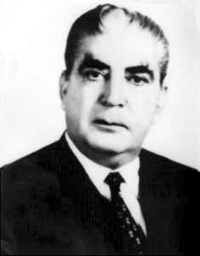Khan, Aga Mohammad Yahya

Khan, Aga Mohammad Yahya (1917-1980) President of Pakistan. An ethnic Pathan, Aga Mohammad Yahya Khan was born on 4 February 1917 at Chakwal in Punjab. Having obtained his graduation from the Punjab University he joined the army and was commissioned from Indian Military Academy at Dehra Dun on 15 July 1939. He served in the Second World War as an officer in the Fourth Infantry Division of the Baluch Regiment in Iraq, Italy and North Africa. In 1947, he was an instructor in the British Indian Staff College at Quetta.
Yahya Khan became a brigadier in 1951 and commanded the 105 Independent Brigade which was deployed on the ceasefire line in Kashmir in 1951-52. In 1954, Yahya Khan, as deputy chief of general staff, was selected to head the army’s planning board set up by Ayub Khan to modernise the Pakistan army. Yahya also performed the duties of chief of general staff from 1957 to 1962 from where he went on to command an infantry division (1962-1965). Immediately after the Indo-Pakistan War of 1965, Major General Yahya Khan was promoted to the rank of lieutenant general, appointed deputy army commander-in-chief and commander-in-chief designate in March 1966. In promotion, Yahya Khan superseded two of his seniors.
Yahya Khan was invested with the state insignia of sitara-e-Pakistan, Hilal-e-Jurat and Hilal-e-Pakistan by President Ayub Khan. In the backdrop of mass upsurge in 1969 against his autocratic rule, President ayub khan failed to solve the acute political problems in both the wings of Pakistan, and handed over state power to the army chief Yahya Khan on 24 March 1969. On 25 March, Yahya Khan promulgated martial law in Pakistan, abrogated the Constitution, dissolved both the national and provincial assemblies, and assumed state power as President and Chief Martial Law Administrator.
Once he has taken state power, Yahya Khan inherited a two-decade constitutional problem of interprovincial rivalry, and an eleven-year old problem of transforming an essentially one man ruled country into a democratic one. Yahya Khan in his broadcast to the nation on 28 July 1969 assured a return to constitutional government in Pakistan, expressed his firm intention to redress the grievances of the Bangalis in East Pakistan, the first major step in this direction being the doubling of Bangali quota in the defence services. He dissolved the one unit restoring the pre-1955 provinces of West Pakistan, and promised free direct one man one vote, fair elections on adult franchise. Yahya also made an attempt to accommodate the East Pakistanis by abolishing the principle of parity, thereby hoping that greater share in the assembly would redress their wounded ethnic regional pride. But Yahya's announcement and actions were too late in timing, and served only to further intensify the political polarization between the East and West wings.
However, within a year Yahya Khan had set up a framework for elections. In the general elections held in December 1970, awami league (led by Sheikh Mujibur Rahman) secured majority seats in both the National and Provincial Assemblies. Pakistan People's Party (led by Zulfiqar Ali Bhutto) held second majority in the National Assembly. But Yahya Khan entered into intrigues against the installation of Awami League in central power in Pakistan. The session of the National Assembly convened earlier was postponed by him on 1 March 1971 for an indefinite period of time. Consequently, as a protest, non-cooperation movement started in the whole of East Pakistan at the instance of Awami League chief Bangabandhu sheikh mujibur rahman. To face the situation, Yahya Khan came to Dhaka and had dialogue with Sheikh Mujibur Rahman (16-24 March). Yahya Khan could not reach a compromise, and instead cracked down on the political agitation in East Pakistan with a massive campaign of genocide named 'operation search light' which began on the night of 25 March 1971. Yahya's crack down ultimately led to the War of Liberation and the emergence of free sovereign Bangladesh.
After Pakistan was defeated in 1971, most of the blame was heaped on Yahya Khan. In the face of serious public agitation Yahya Khan had to step down in favour of Zulfiqar Ali Bhutto on 20 December 1971. Shortly after, the new President Zulfiqar Ali Bhutto ordered for house arrest of his predecessor. Yahya Khan died on 10 August 1980 in Rawalpindi. [Muazzam Hussain Khan]
